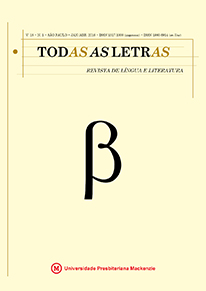Cross-linguistic and cross-cultural communication with emphasis on idiomatic language:
a discoursal contrastive analysis between Portuguese, Xichangana and English
Abstract
Learning and handling rules of idiomatic language usage (rules that contribute to formal appropriacy and cohesion in text), as well as rules of idio-matic language use (rules that contribute to functional appropriacy and dis-course coherence) will enhance mastery of idiomaticity, if language learners are explicitly informed of the discoursal and rhetorical properties involving the target realisation in question. Thus, major discoursal and rhetorical infelicities created by a native or second language interference will tend to occur less fre-quently when explicit discoursal contrastive analysis-based learning is imple-mented. The Portuguese-Shangaan-English project in the Mozambican context is a step in that direction.
Downloads
References
Referências:
HOEY, M. Lexical priming: a new theory of words and language. London: Rout-ledge, 2005.
LOPES, A. J. A batalha das línguas. Perspectivas sobre linguística aplicada em Moçambique/The battle of the languages. Perspectives on applied linguistics in Mozambique. Maputo: Livraria Universitária, 2004.
LOPES, A. J. Língua portuguesa em Moçambique. Revista Brasileira [da Acade-mia Brasileira de Letras], Rio de Janeiro, n. 74, p. 133-150, jan./fev./mar. 2013a.
LOPES, A. J. A batalha das línguas. Perspectivas sobre linguística aplicada em Moçambique.Luanda: Editora das Letras, 2013b.
LOPES, A. J. Língua portuguesa em Moçambique. As timakas e os milandos revisitados. In: BASTOS, N. B. (Org.). Língua portuguesa e lusofonia. São Paulo: Educ, IP-PUC-SP, 2014. p. 35-51.
LOPES, A. J. Géneros textuais e tipos textuais. Texto para o curso de doutorado em ciências da linguagem aplicadas ao ensino de línguas. Maputo: Universida-de Pedagógica, 2015a. Mimeografado.
LOPES, A. J. Política linguística: terra de ninguém, terra de todos. Notas a partir de um posto de observação moçambicano. In: MARTINS, M. L. (Org.). Lusofonia e interculturalidade. Vila Nova de Famalicão: Edições Húmus, 2015b. p. 197-226.
LOPES, A. J. Uma abordagem à idiomaticidade no contexto plurilingue e pluri-cultural de Moçambique. In: CONGRESSO LETRAS EM REDE, 2., 2015, São Paulo. São Paulo: Universidade Presbiteriana Mackenzie, 2015c.LOPES, A. J.; MABASSO, E.; LANGA, P. Com todos os efes e erres. Para um lé-xico de usos idiomáticos – português-inglês-xichangana/With all the bells and whistles. Towards a lexicon of idiomatic usage – Portuguese-English-Shangaan/Kudlaya nsuna ni bawa.Maputo: Imprensa Universitária. No prelo
WIDDOWSON, H. G. Teaching language as communication. Oxford: Oxford Uni-versity Press, 1978.
WOOD, D. Formulaic language and second language speech fluency. London: Continuum, 2010.
WRAY, A. Formulaic language and the lexicon. Cambridge: Cambridge Univer-sity Press, 2002.
Downloads
Published
How to Cite
Issue
Section
License
Copyright (c) 2016 Todas as Letras - Revista de Língua e Literatura

This work is licensed under a Creative Commons Attribution-NonCommercial 4.0 International License.
The originals accepted and published become property of Mackenzie Presbyterian University, being forbidden their total or partial reproduction without permission of the Editorial Board, except for study and research.




